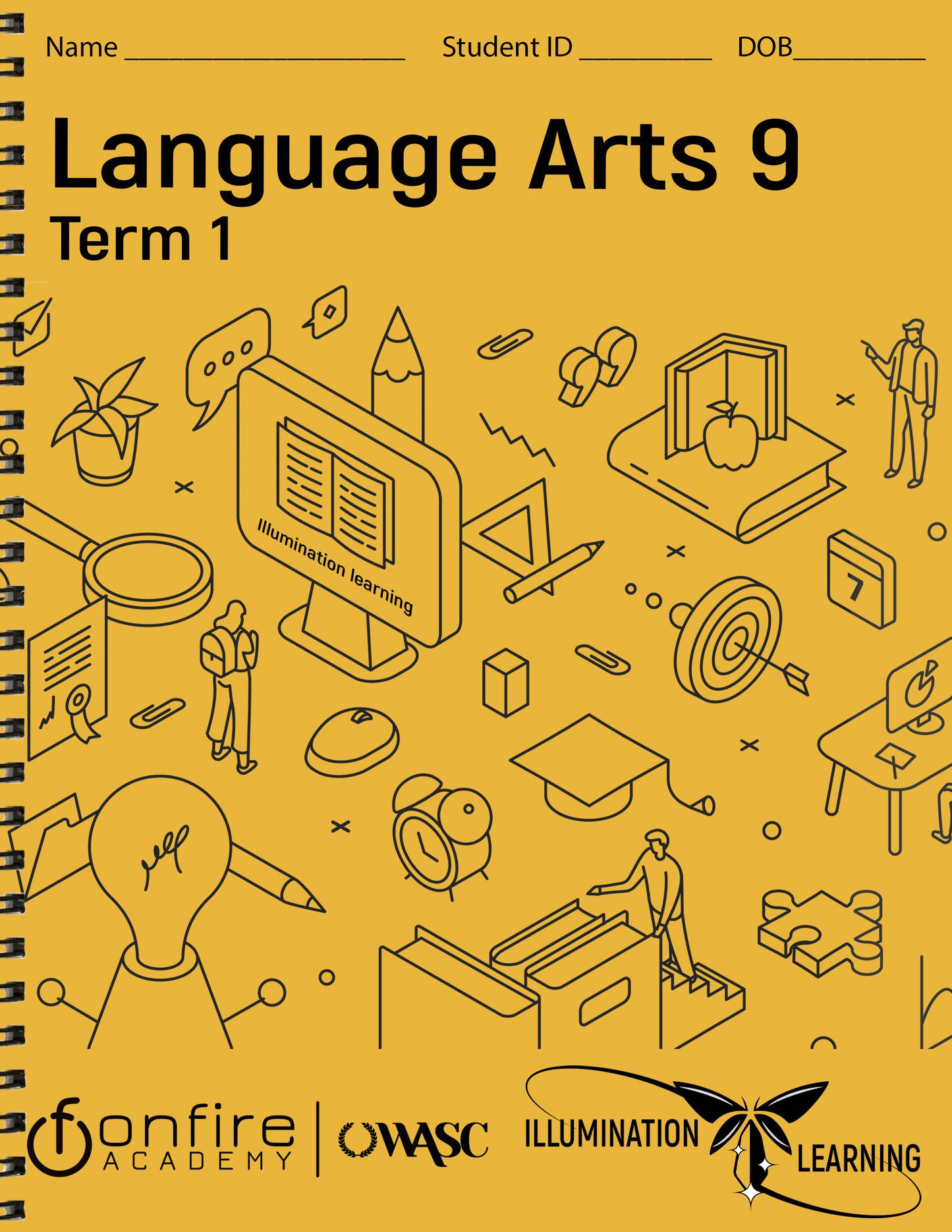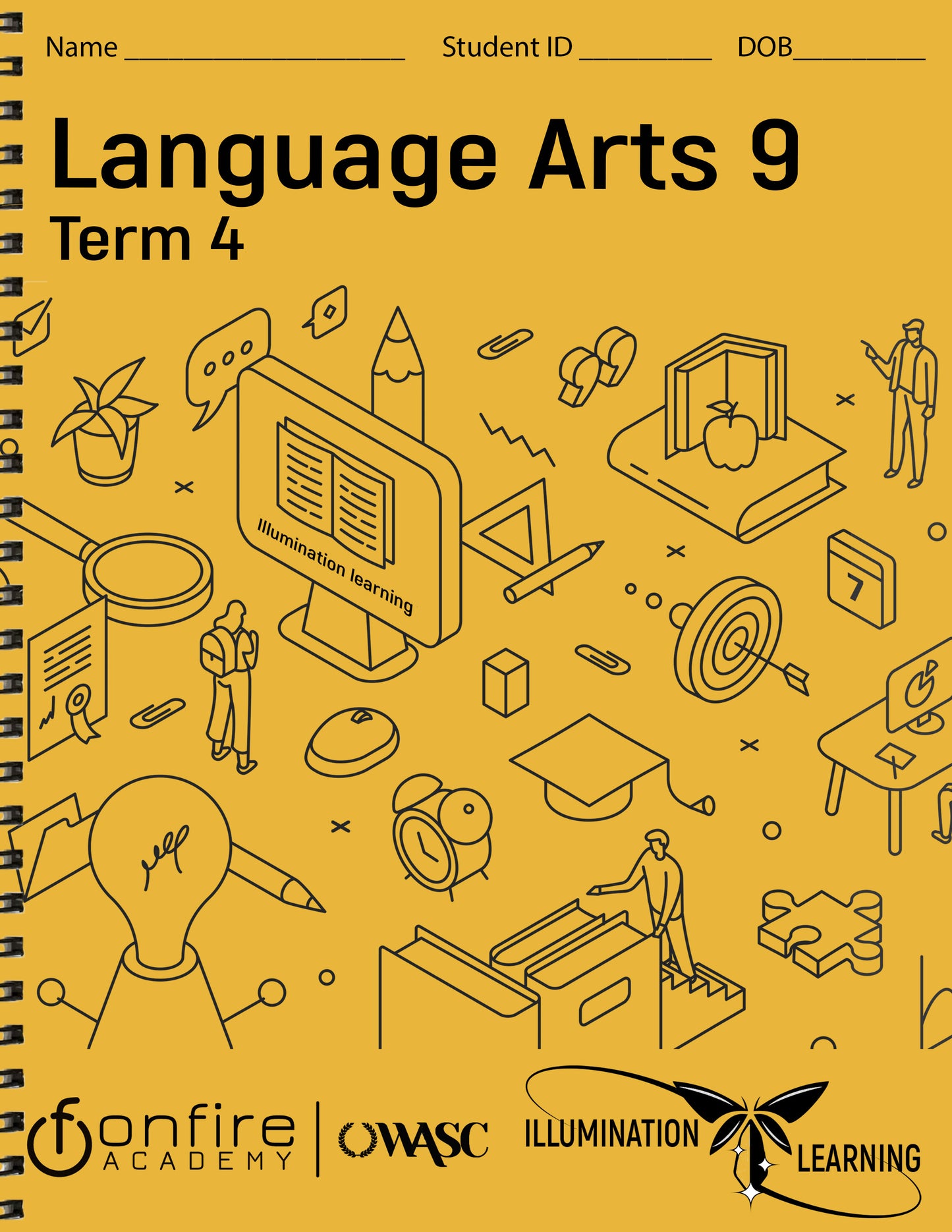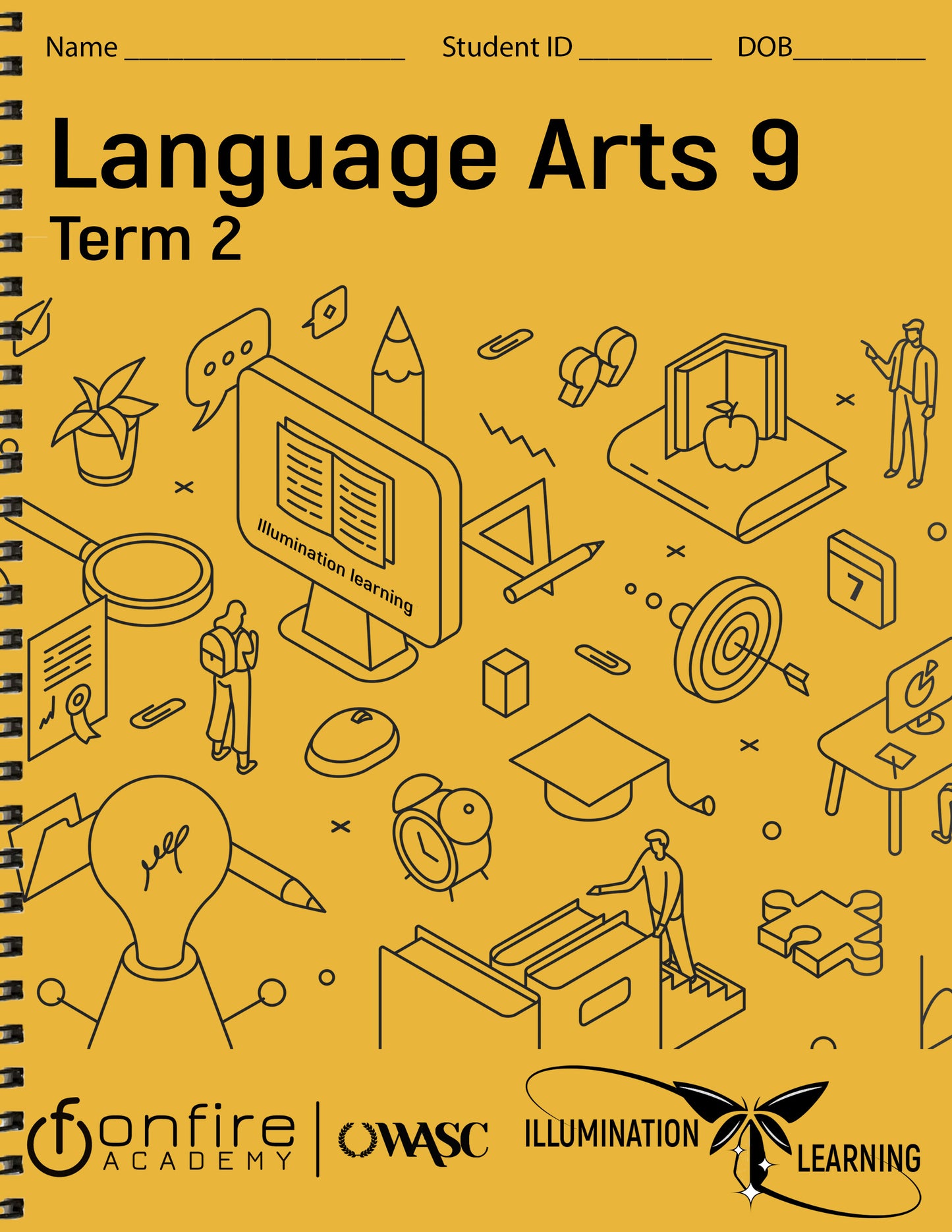ILLUMINATION LEARNING
Language Arts 9 𝘾𝙧𝙚𝙙𝙞𝙩
Language Arts 9 𝘾𝙧𝙚𝙙𝙞𝙩
Couldn't load pickup availability
Language Arts 9 – Term 1 - 4 (sold separately)
This paper and pencil course offers a comprehensive study of English grammar and syntax, helping 9th grade students build a solid foundation in the mechanics of written and spoken communication. Aligned with Common Core State Standards, the course focuses on key areas such as verb tenses, sentence structure, punctuation, and the correction of common grammatical errors.
Across the four terms, students work through structured lessons and interactive exercises that include multiple-choice questions, writing practice, and real-world applications. Each chapter is designed to reinforce core skills while encouraging clear, precise, and confident communication. Practical grammar usage is emphasized to support both academic and personal writing success.
By the end of the course, students will have developed a strong command of standard English conventions, allowing them to express ideas with accuracy and fluency. These essential language skills serve as the building blocks for effective communication and prepare students for more advanced writing and literary analysis in future coursework.
Click Here to See Sample Chapter!
_____________________________________________________________________________
Language Arts 9 – Term 1
Table of Contents
Chapter 1: Introduction to the Hero's Journey
- 1.1 Overview of Archetypes
- 1.2 The Hero's Journey Structure
- 1.3 Multiple Choice Questions (MCQs)
- 1.4 Exercises
- 1.5 The Power of Narrative Reflection
- 1.6 Multiple Choice Questions (MCQs)
- 1.7 Exercises
- 1.8 Reflective Questions
Chapter 2: Navigating Self-Discovery and Resilience
- 2.1 Understanding Identity
- 2.2 Overcoming Challenges and Building Resilience
- 2.3 Multiple Choice Questions (MCQs)
- 2.4 Exercises
- 2.5 The Role of Failure in Growth
- 2.6 The Role of Mentorship: Nurturing Self-Discovery and Resilience
- 2.7 Multiple Choice Questions (MCQs)
- 2.8 Exercises
Chapter 3: The Art of Decision-Making and Consequences
- 3.1 The Complexity of Decision Making
- 3.2 Ethical Considerations in Choices
- 3.3 Multiple Choice Questions (MCQs)
- 3.4 Exercises
- 3.5 Diverse Ways Love Impacts Characters' Decision-Making
- 3.6 Psychological Factors in Decision-Making
- 3.7 Multiple Choice Questions (MCQs)
- 3.8 Exercises
- 3.9 Reflective Questions
__________________________________________________________________________________
Language Arts 9 – Term 2
Table of Contents
Chapter 1: Introduction and Setup
- Understanding Literary Landscapes
- Unraveling the Tapestry of Literary Worlds
- The Power of Setting
- Setting as a Reflection
- Evoking Atmosphere and Mood
- Genre-Specific Elements
- Grounding the Reader in Time and Place
- Exercises and Reflective Questions
Chapter 2: Genre Exploration
- Exploring the Interplay Between Genre and Setting
- What is Genre?
- The Purpose of Genre in Literature
- How Genre is Determined
- Characteristics of Genre (Fiction, Non-Fiction, Poetry, Drama, etc.)
- Audience Expectations and Managing Them
- Intertwining Setting and Genre
- Exercises and Reflective Questions
Chapter 3: Setting as a Character
- Defining Setting
- Setting's Role in Storytelling
- Setting as Mood and Atmosphere
- Reflecting Characters' Emotions through Setting
- Driving Conflict through Setting
- Setting as a Symbol
- Crafting Memorable Settings
- Setting as a Dynamic Force
- Classic Literary Examples (Wuthering Heights, Moby Dick, The Great Gatsby, etc.)
- Exercises and Reflective Questions
Chapter 4: Analytical Writing
- Mastering Analytical Writing
- Pre-Writing Strategies
- Crafting a Strong Thesis Statement
- Building Strong Paragraphs
- The Art of Transitions
- Incorporating Counterarguments
- Polishing Analytical Writing
- Analytical Writing Techniques for Literary Landscapes
- Exercises and Reflective Questions
Chapter 5: Conclusion
- Summary of Genre and Setting Connections
- Final Reflections on the Power of Literary Landscapes
- Preparing for Independent Literary Analysis
__________________________________________________________________________________
Language Arts 9 – Term 3
Table of Contents
Chapter 1: A Midsummer Night’s Dream: A Literary Analysis
- Shakespearean Legacy
- William Shakespeare: A Glimpse into His Life
- Themes Explored in the Play
- Exercises
Chapter 2: Hamlet: A Literary Analysis
- Hamlet: Shakespeare’s Life During Hamlet
- Hamlet: The Play
- Themes Explored in the Play
- Exercises
Chapter 3: The Merchant of Venice: A Literary Analysis
- Shakespeare and Feminism
- The Merchant of Venice: The Play
- Themes Explored in the Play
- Exercises
Chapter 4: Julius Caesar: A Literary Analysis
- Shakespeare and Caesar
- Julius Caesar: The Play
- Themes Explored in the Play
- Exercises
Chapter 5: Macbeth: A Literary Analysis
- Shakespeare During the Writing of Macbeth
- Macbeth: The Play
- Themes Explored in the Play
- Exercises
Chapter 6: Othello: A Literary Analysis
- Othello: The Play
- Themes Explored in the Play
- Exercises
Chapter 7: Romeo and Juliet: A Literary Analysis
- Shakespearean Legacy
- Romeo and Juliet: The Play
- Themes Explored in the Play
- Exercises
__________________________________________________________________________________
Language Arts 9 – Term 4
Table of Contents
Chapter 1: Mastering Verb Tenses
- Introduction to Verb Tenses
- Present Tense Mastery
- Past Tense Mastery
- Future Tense Mastery
- Practice, Practice, Practice
Chapter 2: Polishing Sentence Structure
- Sentence Fundamentals
- Nuances of Sentence Construction
- Modifiers and Clauses
- Types of Sentences
- Sentence Variety
- Practice, Practice, Practice
Chapter 3: Perfecting Punctuation and Avoiding Errors
- Punctuation Proficiency
- Sentence Clarity and Flow
- Avoiding Common Writing Mistakes
- Editing and Proofreading Techniques
- Practice, Practice, Practice
Share







